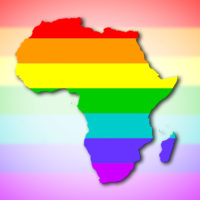Gay rights activist Joseph Achille Tiedjou is worried every day that he will be harassed or arrested in Cameroon.
Defending LGBT rights can be dangerous in Africa, where many countries have laws against homosexuality. But in recent years activists have stepped out of the shadows, empowered by the support of the Obama administration and the international community.
Now many fear the Trump administration will undermine those gains, and that their exposure could make them more vulnerable if support fades.
“I have so many worries with the new administration,” the 32-year-old Tiedjou said, pointing out Trump’s ban on transgender people in the U.S. military. “Obama was known to be very engaged. Hillary Clinton was a champion of LGBT rights and made many guarantees in addressing these issues specifically.”
Obama’s administration made LGBT rights a major domestic and foreign policy, though some in Africa saw it as pushing “Western ideals.” The Obama administration also created a special envoy position on LGBT rights. The Trump administration has said it will keep the post, but concerns remain.
“The difference with the previous administration was that the rights of LGBT people were explicitly part of foreign policy. So LGBT groups around the world could absolutely rely on the moral and, indeed, material support that came from the U.S. government and that made a huge difference,” said Graeme Reid, director of Human Rights Watch’s Lesbian, Gay, Bisexual and Transgender Rights Program. “Under this administration, we are no longer going to be seeing that proactive engagement around LGBT rights.”
Though the Trump administration’s overseas policies on LGBT rights remain to be seen, the erosion of domestic advances directly undermines the authority of the U.S. to speak out internationally, Reid said. He cited the pushback against federal protections and the appointment of “openly homophobic officials” to senior government positions.
The U.S. recently joined a dozen other countries to vote against a U.N. Human Rights Council resolution that urged countries not to use the death penalty for specific forms of conduct, including consensual same-sex relations. State Departmentspokeswoman Heather Nauert said the vote was made “because of broader concerns with the resolution’s approach in condemning the death penalty in all circumstances” but said the U.S. “unequivocally condemns the application of the death penalty for conduct such as homosexuality.”
Same-sex acts are illegal in more than 33 African countries and can lead to death sentences in parts of at least four, including Mauritania, Sudan, northern Nigeria and southern Somalia, according to Amnesty International.
Homosexuality is criminalized in the East African countries of Uganda, Kenya and Tanzania. In Tanzania, authorities recently stopped health providers from non-governmental organizations from providing services to LGBT people.
In Cameroon, a strong ally of the U.S. in the fight against extremism, Human Rights Watch has documented high levels of arrests of LGBT people.
October 15, 2017 – By CARLEY PETESCH, ASSOCIATED PRESS
Click here to read the entire article.
The post LGBT activists worry about Trump impact in Africa appeared first on Time For Families.
Source: Time for Families

